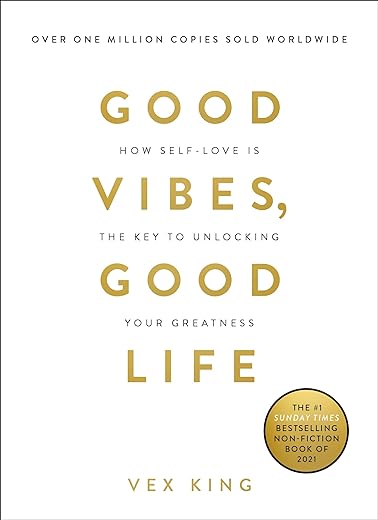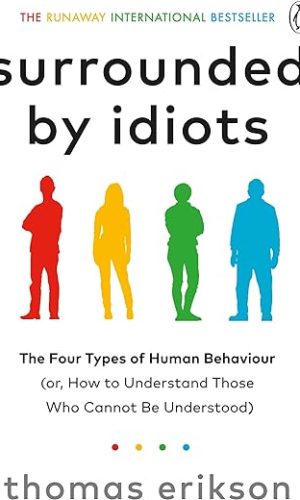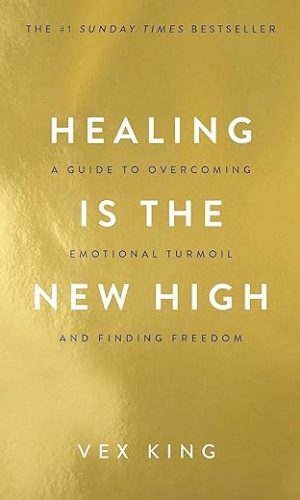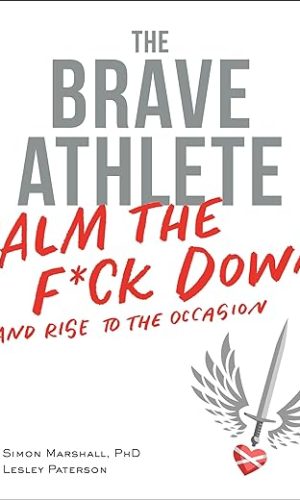Good Vibes, Good Life: How Self-Love Is the Key to Unlocking Your Greatness: THE #1 SUNDAY TIMES BESTSELLER
£11.20£12.30 (-9%)
The #1 Sunday Times bestselling non-fiction book of 2021 – over one million copies sold worldwide.
Join the self-love revolution with visionary writer Vex King and discover inspirational messages and universal wisdom to help you manifest positive vibes.
Vex overcame adversity to become a source of hope for thousands of young people, and now draws from his personal experience and his intuitive wisdom to inspire you to:
– practise self-care, overcome toxic energy and prioritize your wellbeing
– cultivate positive lifestyle habits, including mindfulness and meditation
– change your beliefs to invite great opportunities into your life
– manifest your goals using tried-and-tested techniques
– overcome fear and flow with the Universe
– find your higher purpose and become a shining light for others
In this book, Vex will show you that when you change the way you think, feel, speak and act, you begin to change the world.
Read more
Additional information
| Publisher | Hay House UK (4 Dec. 2018) |
|---|---|
| Language | English |
| Paperback | 320 pages |
| ISBN-10 | 1788171829 |
| ISBN-13 | 978-1788171823 |
| Dimensions | 12.85 x 2.08 x 17.63 cm |










by Amanda Fuller
Easy to read but makes you think about how you approach life and all it’s many complexities.
by A. Khan
I am dyslexic and have been avoiding reading books as much as I can, yet this book very quickly changed me as a person. Firstly it was so easy to read that I had felt I had actually accomplished something big by getting through it so quickly. I felt I had been waiting for the right answer to situations that I did not know how to deal with and this is the first time that I had been given the answers to every aspect of life. This book is so relatable, it puts into words feelings that I could not explain, it understands me and trusts me more than I do myself, yet it has taught me that I should accept myself and that’s the key to inner peace. It talks much about balance and I think this is a key aspect which has changed the way I look at things.
One of the challenges that I have been facing is that I am the type of person that doesn’t speak up when someone has hurt me I keep it in, I never feel as if my opinion is important because I choose peace over confrontation. A lot of the company I am around are vibrating much lower than I am and it brings my vibration level down with it. This book has given me confidence that I should not let myself fall to the same vibration level as they are and I should focus on keeping my vibration levels up. It’s taught me self worth and I highly recommend this book
by K
As a personal trainer I find myself in a constant battle trying to STOP my clients from following the ideas in this book. The premise ‘self-love is the key to unleashing your greatness’ has been proven by psychologists such as Roy Baumeister and Jean M. Twenge to have disastrous consequences for those who adhere to it.
Self-esteem is not a bad thing in general, but it is by no means a prerequisite for initial success. The reality is that the opposite is true. Self-esteem is acquired as a RESULT of success, and we know this to be true from a wide array of data, one example being that Asian-American children have very low self-esteem yet achieve the highest grades in the USA.
Vex King’s advice for ‘unlocking greatness’ backfires on his readers in two ways:
The first is that it leaves the reader in a continuous loop of failure and procrastination. If Vex asserts that self-esteem needs to be present during the journey to success then his followers will logically, consciously or unconsciously, come to the conclusion that there’s no point pursuing success without first acquiring self-esteem. With this reasoning it can seem like self-esteem is as crucial as taking a passport to the airport, which is why it makes sense to prioritise acquiring self-esteem above all else, even the journey towards success itself.
We can see this mentality manifest in unsuccessful people who spend much of their time consuming motivational material (like this book) in hopes of boosting their sense of self-worth, yet never seem to progress towards their goals because they never do the work that’s actually required to excel in their endeavour.
As a result, they never actually gain a true foundation self-esteem (because it comes after the work) but instead become hooked on short-term feel-good highs that Instagram gurus and the wider self-help industry are more than willing to provide in constant supply.
The second way Vex’s advice backfires on his readers is by helping to foster a closed-minded mentality. If you manage convince yourself that you have high self-esteem without actually having anything to prove such status then this can be considered a ‘delusion’. Delusional people tend to get very defensive about things because their conception of reality is very carefully constructed and, therefore, fragile.
A delusional person will see any information that counters their poorly manufactured sense of self-esteem as a threat and will defend it, both internally and externally, because their entire understanding of their worth relies on it staying intact. Inwardly this manifests as denial of character flaws, avoidance of taking risks, and giving up with tasks quickly with a ready excuse to rationalise failure. Outwardly, it manifests as aggression towards behaviour deemed offensive, however the very reason it’s considered offensive is because they’re avoiding a reality that can shatter the delusion. All of this, once again, prevents a person from actually taking the risks and emotional feedback needed for success.
Not only is the fundamental message of this book flawed it also serves as a recipe for entitlement, the type of thinking that leads someone to think they are owed something without having earned it. It is true that, on occasion, Vex advocates the necessity for hard work and gratitude, however the book is full of contradictions that negate this message every time. The most striking example of this is as follows:
“Self-love is the balance between accepting yourself as you are while knowing you deserve better, and then working towards it.”
This sounds nice on paper however when you really think about the message conveyed the advice quickly falls apart. Human beings are naturally lazy creatures. Unless we feel a sense of danger we tend to conserve our energy. If you are dangerously overweight and convince yourself to ‘accept yourself as you are’, then you rationalise yourself out of the motivation to actually lose that weight. Combine this with the message of ‘deserving better’ and ‘unconditional love towards yourself’ you end up with the likes of the ‘fat acceptance’ movement – essentially people who have deluded themselves into self-love and inaction but feel victimised by naturally negative social feedback to their appearance.
The entitlement mentality is reinforced by the fact that throughout the book Vex frequently shows disdain for the idea of ‘settling for mediocrity’. Again, there lie two problems in this message:
The first is that mediocrity is subjective, and so not only does the notion vary from person to person but can also change in meaning for the individual themselves. A BMW 3 Series may seem like a luxury for a 17-year-old yet mediocre for a 60-year-old. The vague advice of telling somebody not to settle for mediocrity leaves them in a continuous state of dissatisfaction and ingratitude as the standard for mediocrity is never declared.
In the book “The Paradox of Choice” by psychologist Barry Schwartz, he makes the case that ‘settling’ for ‘good enough’ is actually far more satisfying than constantly searching for ‘best’. For some people, working a nine to five job and coming home to a family may be ‘mediocre’ on a grand scale – yet still extremely satisfying by their own standards.
Vex also preaches a message that is a poison spreading through our culture. What he, knowingly or unknowingly, advocates is ‘hedonism’. This is the philosophy of living a life characterised by the pursuit of pleasure and minimisation of pain, and he admits this early in the book where he states his intention is to release people ‘from undesirable feelings and increase feelings of joy.’ It’s also plainly evident in title of his book ‘Good Vibes, Good Life’.
Telling people ‘if it feels good do it’ sounds liberating on the surface, but what it also implies is ‘if it doesn’t feel good, don’t do it.’ This advice also only seems relevant if you assume that most people today are unhappy due to excessive self-constraint. We all know, however, that this isn’t the case. In the 21st century the problem that plagues most people is that they seriously lack discipline and it’s specifically because they keep engaging in ‘feel good’ behaviours in the short term while sacrificing their long-term potential.
The fact is that if you want to ‘unleash your greatness’ you need to consistently work hard and make sacrifices, and unfortunately this doesn’t always feel good. Nobody is motivated to go for their scheduled run every single time, and even during the runs that they are motived for, it’s still not a ‘feel good’ experience. Most of the time you’re trying to convince yourself why you should keep enduring the pain and you do it for the satisfaction and progress towards your goals.
Instead of living by the self-defeating and weak-minded mantra of ‘good vibes good life’, it would be better to adhere to the wisdom of former US Navy SEAL commander Jocko Willink that ‘discipline equals freedom’ because it is the ability to overcome your lack of motivation and to do the task regardless that separates the winners and losers.
Fans of Vex King may wonder that if his theory is destructive then how come it’s sold so many copies and has so many good reviews? The popularity and enjoyment of a book does not grant validity to its ideas. Hitler’s Mein Kampf sold well in the 1930s, and had Amazon/Goodreads existed it would have undoubtedly been flooded with 5 star reviews, but that, of course, does not validate its theories.
by Shalik scarlett
I really wanted to get the hardback, as sometimes paperback quality isnt great, but it was highly exceptional
by ML
It’s not particularly gripping, it’s the same advice or suggestions I’ve read in many places before. It’s written pleasantly enough for an easy read (if you can stay engaged) but nothing revolutionary so I did not feel inspired or uplifted by it as I had hoped. Everything in it was just to familiar to every other piece of writing on that subject.
by Susan
purchased as a gift
by Kasib R.
Looks nice
by Yenifers
Very relatable. This book flows so well and I felt it was really easy to implement the tools and tips in my day to day life. It helped me become a better version of myself. Best book I’ve read so far.